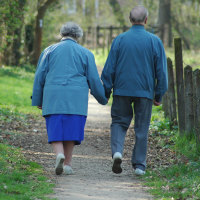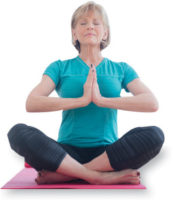Some of the things they said were good for us…
 Nature Walks can make you healthier and happier by driving out obsessive, negative thoughts. A Stanford University study found that strolling in a natural setting decreases activity in the subgenual prefrontal cortex, a brain region particularly active during rumination. “It was pretty striking that a 90-minute walk had this much of an impact,” says author Gregory Bratman. For people with a tendency to brood, interrupting an endless stream of negative thoughts reduces the risk for depression and other mental illnesses. Green spaces may also make kids smarter. A separate study of roughly 2,600 fourth-graders in Barcelona found that those with greater exposure to nature were more attentive and experienced a 5 percent increase in working memory.
Nature Walks can make you healthier and happier by driving out obsessive, negative thoughts. A Stanford University study found that strolling in a natural setting decreases activity in the subgenual prefrontal cortex, a brain region particularly active during rumination. “It was pretty striking that a 90-minute walk had this much of an impact,” says author Gregory Bratman. For people with a tendency to brood, interrupting an endless stream of negative thoughts reduces the risk for depression and other mental illnesses. Green spaces may also make kids smarter. A separate study of roughly 2,600 fourth-graders in Barcelona found that those with greater exposure to nature were more attentive and experienced a 5 percent increase in working memory.
Awe-inspiring experiences can help you live longer. Gazing out over the Grand Canyon or beholding an artistic masterpiece can trigger positive emotions with immune-boosting, anti-inflammatory effects that help prevent heart disease and depression, among other chronic health issues. Researchers at the University of California, Berkeley found that feelings of awe and wonder are associated with lower levels of cytokines, pro-inflammatory proteins that can stress the immune system. While negative emotions are “reliably associated with poorer health,” the study’s authors note, “only recently has research begun to acknowledge the important role of positive emotions.”
 A glass of wine each day could improve heart health and blood sugar control among people with type 2 diabetes. A study in Israel suggested that if you suffer from the condition and incorporate a moderate amount of red wine into a heart healthy diet, it may boost “good” cholesterol levels by 10 percent . Red varietals are also rich in beneficial compounds that are linked to fewer symptoms of metabolic syndrome, a group of factors that raise the risk for heart disease, diabetes, and stoke. What’s more, a daily glass of red or white wine may improve the metabolism of type 2 diabetics, who absorb alcohol more slowly than others. Those patients “who drink wine in moderation can continue to do so,” says author Meir Stampfer, “and with the knowledge that it is safe and likely beneficial.”
A glass of wine each day could improve heart health and blood sugar control among people with type 2 diabetes. A study in Israel suggested that if you suffer from the condition and incorporate a moderate amount of red wine into a heart healthy diet, it may boost “good” cholesterol levels by 10 percent . Red varietals are also rich in beneficial compounds that are linked to fewer symptoms of metabolic syndrome, a group of factors that raise the risk for heart disease, diabetes, and stoke. What’s more, a daily glass of red or white wine may improve the metabolism of type 2 diabetics, who absorb alcohol more slowly than others. Those patients “who drink wine in moderation can continue to do so,” says author Meir Stampfer, “and with the knowledge that it is safe and likely beneficial.”
 Meditation may help people stay mentally sharp. Brain bulk peaks in the early 20’s and gradually declines over time, as the brain loses weight and volume. But brain scans taken in a UCLA study revealed that years of meditation are associated with smaller reductions in gray matter throughout the brain. “What we expected was to see this in just a few small regions… but what we saw was almost the entire brain. That was a big surprise,” says co-author Florian Kuth. By preserving brain tissue involved in memory decision-making, and sensory perception, the study suggests, meditation could reduce the risk for age-related cognitive decline.
Meditation may help people stay mentally sharp. Brain bulk peaks in the early 20’s and gradually declines over time, as the brain loses weight and volume. But brain scans taken in a UCLA study revealed that years of meditation are associated with smaller reductions in gray matter throughout the brain. “What we expected was to see this in just a few small regions… but what we saw was almost the entire brain. That was a big surprise,” says co-author Florian Kuth. By preserving brain tissue involved in memory decision-making, and sensory perception, the study suggests, meditation could reduce the risk for age-related cognitive decline.
Olive oil could dramatically reduce a woman’s chances of developing breast cancer. Researchers found that when women over 60 added a generous dose of extra-virgin olive oil to a diet rich in fruits, vegetables, fish, nuts, and whole grains, it cut their risk for the disease by 68 percent. Olive oil contains powerful antioxidants, called polyphenols, study authors explain, and deriving at least 15 percent of total calories from it “seems to be instrumental” in staving off breast cancer
 Uninterrupted sleep may help ward off Alzheimer’s disease. A study involving some 2,500 older people showed that, on average, subjects who slept fitfully or suffered from sleep apnea developed mild cognitive impairment about 10 years earlier than sound sleepers. Researchers also found a lack of deep sleep may fuel the toxic accumulation of a sticky protein, called amyloid beta, in the brain – a hallmark of the degenerative, memory-robbing disease. “Sleep,” says author Bryce Mander, “appears to be a missing piece in the Alzheimer’s puzzle.”
Uninterrupted sleep may help ward off Alzheimer’s disease. A study involving some 2,500 older people showed that, on average, subjects who slept fitfully or suffered from sleep apnea developed mild cognitive impairment about 10 years earlier than sound sleepers. Researchers also found a lack of deep sleep may fuel the toxic accumulation of a sticky protein, called amyloid beta, in the brain – a hallmark of the degenerative, memory-robbing disease. “Sleep,” says author Bryce Mander, “appears to be a missing piece in the Alzheimer’s puzzle.”
…and some of the things we were told to avoid
Belly fat is a serious health concern, even if you’re thin. Men and women with excess weight around the middle are significantly more likely to die from heart disease than adults whose fat is more evenly distributed, a Mayo Clinic study revealed, no matter where they tip the scales. Even in people with a “normal” body mass index – a weight-height – belly blubber is linked to a buildup of deeper visceral fat that wraps around internal organs, increasing the risk for heart attack, stroke, and type 2 diabetes. “We need to talk about waist loss,” says cardiologist Paul Poirier, “not weight loss.”
 Sitting may be worse for us than smoking. A study revealed that remaining sedentary for extended periods can dramatically increase the risk for chronic health issues, including heart disease, diabetes, and depression. Not only that, but the negative effects of prolonged sitting aren’t offset by intense exercise before or after work. People with desk jobs should be on their feet or at least two hours daily, either by talking occasional strolls or using a standing desk. “We are creatures of habit,” says co-author Gavin Bradley, “and we have come to the wrong conclusion, that sitting is the optimum way of conducting office work.”
Sitting may be worse for us than smoking. A study revealed that remaining sedentary for extended periods can dramatically increase the risk for chronic health issues, including heart disease, diabetes, and depression. Not only that, but the negative effects of prolonged sitting aren’t offset by intense exercise before or after work. People with desk jobs should be on their feet or at least two hours daily, either by talking occasional strolls or using a standing desk. “We are creatures of habit,” says co-author Gavin Bradley, “and we have come to the wrong conclusion, that sitting is the optimum way of conducting office work.”
High heels can cause sprained ankles and feet as well as broken bones, Injuries involving high heeled footwear doubled in the U.S. between 2002 and 2012, researchers learned, during which time American women suffered more than 123,355 mishaps severe enough to warrant a trip to the emergency room. Those fashionable pumps and strappy sandals can affect gait, balance, and range of foot motion, warns lead investigator Gerald McGwin, and it’s important to “understand the risk and the potential harm that precarious activities in high-heeled shoes can cause.”
 Shift work can be unhealthy, increasing the risk of heart disease, and obesity, and metabolic disorders. Researchers in Finland tracked airline employees and found that people who worked nights or irregular hours slept less than peers who were scheduled for the regular business day. Beyond that, “it seems that shift work itself strongly affects workers’ eating habits,” says study leader Katri Hemio, noting they ate fewer vegetables and consumed more fat. One way to address the problem, experts say, is to stock workplace vending machines with healthier foods and provide refrigerators, so employees can bring healthier meals from home.
Shift work can be unhealthy, increasing the risk of heart disease, and obesity, and metabolic disorders. Researchers in Finland tracked airline employees and found that people who worked nights or irregular hours slept less than peers who were scheduled for the regular business day. Beyond that, “it seems that shift work itself strongly affects workers’ eating habits,” says study leader Katri Hemio, noting they ate fewer vegetables and consumed more fat. One way to address the problem, experts say, is to stock workplace vending machines with healthier foods and provide refrigerators, so employees can bring healthier meals from home.
Loneliness increases the risk of death by up to 14 percent, a University of Chicago study found. The stressful pangs of unwanted solitude trigger the “flight or fight” response, causing inflammation and cellular changes that disrupt the production of white blood cells that protect the body from illness. Social isolation does improve the body’s ability to fight harmful bacteria, but it also makes people more susceptible to viral infections. “the lonelier one is and the longer one is lonely,” author John Cacioppo says, “the greater the negative effects.”


